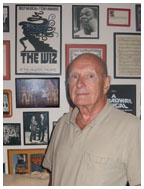October 11, 2006: Books and Arts
Reading Room
Making fun of pushy parents
Ease on down the road again
William F. Brown ’50 “re-imagines” Broadway hit after three decades
Andrew Trees ’90, a history teacher at Horace Mann School, has drawn ire from the private school world. (Bloomsbury) |
Reading Room
Making
fun of pushy parents
Andrew Trees ’90 pens a novel drawing on insider knowledge
of elite high schools.
One spring day a few years ago, Andrew Trees ’90, a history teacher at Horace Mann School in New York City, met with parents who “spent about an hour trying to badger me” into giving their child a higher grade. That night Trees went home and began his first novel, Academy X. The main character and narrator is John Spencer, a flawed but likable 30-something single English teacher at an elite private school in New York. Spencer faces pushy parents, manipulative students (including the sexy Caitlyn, who is angling her way into Princeton), and administrators who engage in unethical behavior to appease wealthy donor-parents.
 Having
written a scholarly book on the founding fathers for his history dissertation
at the University of Virginia, Trees had been thinking before that evening
of penning a biography of Alexander Hamilton. But his plans changed. “I
kept either seeing or hearing from friends all these crazy things at school,”
he says, like a friend teaching at another private school who received
a letter from a parent on legal letterhead — a veiled threat to change
a grade. Trees decided that kind of story would make perfect fodder for
a novel in the vein of The Nanny Diaries. “There was a therapeutic
element” to writing the novel, admits Trees, who majored in religion at
Princeton.
Having
written a scholarly book on the founding fathers for his history dissertation
at the University of Virginia, Trees had been thinking before that evening
of penning a biography of Alexander Hamilton. But his plans changed. “I
kept either seeing or hearing from friends all these crazy things at school,”
he says, like a friend teaching at another private school who received
a letter from a parent on legal letterhead — a veiled threat to change
a grade. Trees decided that kind of story would make perfect fodder for
a novel in the vein of The Nanny Diaries. “There was a therapeutic
element” to writing the novel, admits Trees, who majored in religion at
Princeton.
Detractors of Academy X, published by Bloomsbury in June, have accused Trees of exposing dirty laundry and cynically trying to cash in. His harshest critic on record has been a trustee at a private school who is quoted in The New York Sun as calling Trees “the biggest self-righteous, arrogant traitor walking the face of the earth.” Trees counters that the issues he writes about in Academy X — cheating, grade grubbing, and the intense pressure around college admissions — are issues at all high-achieving schools, private and public. He never intended the novel to be dark; it’s satirical, says Trees, who attended Deerfield Academy, a boarding school in Massachusetts.
In the novel, John Spencer bumbles along, trying to inspire his senior class in the final weeks of the spring semester. Caitlyn’s father tries to “make a deal” with (read: bribe) Spencer into ignoring his daughter’s plagiarism. The school’s college counselor entices Spencer with courtside Knicks tickets into writing a glowing (read: not altogether accurate) recommendation letter for Caitlyn.
Trees insists his novel is fiction — “it’s not a memoir,” he says. The characters in the novel are not based on any individuals at Horace Mann, and John Spencer, who is accused of sexual harassment by Caitlyn, is certainly not Trees. Most students and parents at Horace Mann are a pleasure to work with, he says.
Despite the publicity around Academy X, Trees still has a job
at Horace Mann. Going on his sixth year, he teaches two classes and spends
the rest of his time writing. ![]()
By K.F.G.
 Uncommon Carriers — John McPhee ’53 (Farrar, Straus and Giroux).
The author profiles people who work in freight transportation, including
a truck driver, ship captain, and towboat pilot. McPhee describes his
journeys with these people, including rides in the cabs of coal trains
and a drive from Atlanta to Tacoma with the owner of a 65-foot, five-axle,
18-wheel tanker carrying hazardous materials. McPhee is a professor of
journalism at Princeton.
Uncommon Carriers — John McPhee ’53 (Farrar, Straus and Giroux).
The author profiles people who work in freight transportation, including
a truck driver, ship captain, and towboat pilot. McPhee describes his
journeys with these people, including rides in the cabs of coal trains
and a drive from Atlanta to Tacoma with the owner of a 65-foot, five-axle,
18-wheel tanker carrying hazardous materials. McPhee is a professor of
journalism at Princeton.
 On Late Style: Music and Literature Against the Grain — Edward
W. Said ’57 (Pantheon). In this work of criticism, published posthumously,
the author explores how approaching death can influence an artist’s work.
He looks at works written late in the lives of Beethoven, Thomas Mann,
Shakespeare, and other writers and musicians, and argues that most reveal
deep conflict and impenetrable complexity. Said died in 2003. He taught
comparative literature at Columbia.
On Late Style: Music and Literature Against the Grain — Edward
W. Said ’57 (Pantheon). In this work of criticism, published posthumously,
the author explores how approaching death can influence an artist’s work.
He looks at works written late in the lives of Beethoven, Thomas Mann,
Shakespeare, and other writers and musicians, and argues that most reveal
deep conflict and impenetrable complexity. Said died in 2003. He taught
comparative literature at Columbia.
 Anonymous Lawyer — Jeremy Blachman ’00 (Henry Holt). This satirical
novel is written in blog form, in the snobby, grouchy voice of the hiring
partner of a prestigious law firm. He secretly blogs about the summer
interns he scares, his bitter rival at the firm, and his wife, who likes
to spend his money. Trouble ensues when someone inside the firm discovers
he is the author of the blog. Blachman is the author of a blog also titled
Anonymous Lawyer.
Anonymous Lawyer — Jeremy Blachman ’00 (Henry Holt). This satirical
novel is written in blog form, in the snobby, grouchy voice of the hiring
partner of a prestigious law firm. He secretly blogs about the summer
interns he scares, his bitter rival at the firm, and his wife, who likes
to spend his money. Trouble ensues when someone inside the firm discovers
he is the author of the blog. Blachman is the author of a blog also titled
Anonymous Lawyer. ![]()
By K.F.G.
For a complete list of books received, click here.
William F. Brown ’50’s revised Wiz premiered in La Jolla, Calif. (Van Wallach ’80) |
Ease
on down the road again
William F. Brown ’50 “re-imagines” Broadway hit after three
decades
By Van Wallach ’80
More than 30 years after he wrote the libretto for the Broadway hit The Wiz, William F. Brown ’50 is revising the musical. Earlier this year Brown began working with director Des McAnuff to create a “re-imagined” version that was to premiere Oct. 8 at California’s La Jolla Playhouse, a major regional theater.
Brown, a resident of Westport, Conn., says of the refurbished Wiz, “It’s the same show and story and music, but it will look entirely different. It will have a lot of flying, not only the flying monkeys, but also Glinda,” the good witch. Costumes and orchestrations will be changed, and an “environmental set” will have Oz surround the theater. And in this version, Toto will be played by a dancer, not a dog.
The Wiz ran for 1,642 performances after its 1975 Broadway opening and won seven Tony awards, including Best Musical. As the librettist, Brown wrote all of The Wiz except for the songs. Now, he’s writing again, revising to reflect McAnuff’s vision of the updated production. Two songs have been cut, so Brown is adding dialogue to maintain the script’s continuity. Perhaps most important, Brown is updating the language to reflect changes in African-American vernacular since the 1975 debut. He explains: “For example, when Dorothy meets the scarecrow, originally he says to her, ‘Hey, honey, you got some spare change?’ Now it’s just ‘Wassup?’ ”
Brown returned to the yellow brick road early this year after co-producers Michael David and Lauren Mitchell optioned the play, giving them exclusive rights to a new production. They’re working with Tony Award-winner McAnuff, the artistic director of the La Jolla Playhouse. McAnuff has directed plays such as Jersey Boys, 700 Sundays (Billy Crystal’s solo show), and Urinetown.
The Wiz project is just the latest outlet for Brown’s multiple energies as a writer, playwright, and cartoonist. His interest in theater dates to his Princeton days, when he wrote for the Triangle show. As an undergraduate he sold his first cartoon to King Features, and he published a book of Princeton-related cartoons called Tiger, Tiger.
For 10 years Brown wrote and drew the syndicated comic strip “Boomer.” His theatrical credits include How to Steal an Election: A Dirty Politics Musical and The Girl in the Freudian Slip. He was brought into the original Wiz project by Ken Harper, an African-American disc jockey-cum-producer who was developing the idea. Brown says he became the “only white guy on the creative team.”
Brown hopes the new show will reach Broadway sometime before next May, when the Tonys are awarded. For that to happen, the show must find a theater in New York, a challenge for musicals these days.
“You can never be sure how something works until it’s in front of an
audience. If something doesn’t work, I’ll change it,” he says. “That’s
the way it went the last time. I was rewriting until about three days
before it opened in New York.” ![]()
Van Wallach ’80 is a freelance writer in Stamford, Conn.


